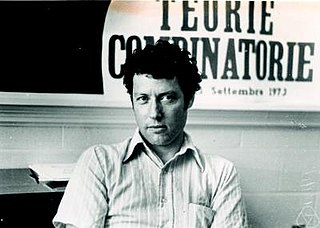Combinatorics is an area of mathematics primarily concerned with counting, both as a means and as an end to obtaining results, and certain properties of finite structures. It is closely related to many other areas of mathematics and has many applications ranging from logic to statistical physics and from evolutionary biology to computer science.
In combinatorics, a branch of mathematics, a matroid is a structure that abstracts and generalizes the notion of linear independence in vector spaces. There are many equivalent ways to define a matroid axiomatically, the most significant being in terms of: independent sets; bases or circuits; rank functions; closure operators; and closed sets or flats. In the language of partially ordered sets, a finite simple matroid is equivalent to a geometric lattice.
Lists of mathematics topics cover a variety of topics related to mathematics. Some of these lists link to hundreds of articles; some link only to a few. The template to the right includes links to alphabetical lists of all mathematical articles. This article brings together the same content organized in a manner better suited for browsing. Lists cover aspects of basic and advanced mathematics, methodology, mathematical statements, integrals, general concepts, mathematical objects, and reference tables. They also cover equations named after people, societies, mathematicians, journals, and meta-lists.

David Eisenbud is an American mathematician. He is a professor of mathematics at the University of California, Berkeley and former director of the then Mathematical Sciences Research Institute (MSRI), now known as Simons Laufer Mathematical Sciences Institute (SLMath). He served as Director of MSRI from 1997 to 2007, and then again from 2013 to 2022.
In mathematics, two objects, especially systems of axioms or semantics for them, are called cryptomorphic if they are equivalent but not obviously equivalent. In particular, two definitions or axiomatizations of the same object are "cryptomorphic" if it is not obvious that they define the same object. Examples of cryptomorphic definitions abound in matroid theory and others can be found elsewhere, e.g., in group theory the definition of a group by a single operation of division, which is not obviously equivalent to the usual three "operations" of identity element, inverse, and multiplication.
The Deborah and Franklin Tepper Haimo Awards for Distinguished College or University Teaching of Mathematics are awards given by the Mathematical Association of America to recognize college or university teachers "who have been widely recognized as extraordinarily successful and whose teaching effectiveness has been shown to have had influence beyond their own institutions." The Haimo awards are the highest teaching honor bestowed by the MAA. The awards were established in 1993 by Deborah Tepper Haimo and named after Haimo and her husband Franklin Haimo. After the first year of the award up to three awards are given every year.

Algebraic combinatorics is an area of mathematics that employs methods of abstract algebra, notably group theory and representation theory, in various combinatorial contexts and, conversely, applies combinatorial techniques to problems in algebra.
In matroid theory, the dual of a matroid is another matroid that has the same elements as , and in which a set is independent if and only if has a basis set disjoint from it.
Lawrence David Guth is a professor of mathematics at the Massachusetts Institute of Technology.
Aubrey William Ingleton (1920–2000) was an English mathematician.

Karim Alexander Adiprasito is a German mathematician working at the University of Copenhagen and the Hebrew University of Jerusalem who works in combinatorics. He completed his PhD in 2013 at Free University Berlin under the supervision of Günter M. Ziegler. He has been a professor at the Hebrew University since 2015, and at the University of Copenhagen since 2019. He is of German and Indonesian descent, and bears an Indonesian surname.

Zvezdelina Entcheva Stankova is an American mathematician who is a professor of mathematics at Mills College and a teaching professor at the University of California, Berkeley, the founder of the Berkeley Math Circle, and an expert in the combinatorial enumeration of permutations with forbidden patterns.
Eric Katz is a mathematician working in combinatorial algebraic geometry and arithmetic geometry. He is currently an associate professor in the Department of Mathematics at Ohio State University.

3Blue1Brown is a math YouTube channel created and run by Grant Sanderson. The channel focuses on teaching higher mathematics from a visual perspective, and on the process of discovery and inquiry-based learning in mathematics, which Sanderson calls "inventing math". As of April 2024, the channel has 6.04 million subscribers.
Numberphile is an educational YouTube channel featuring videos that explore topics from a variety of fields of mathematics. In the early days of the channel, each video focused on a specific number, but the channel has since expanded its scope, featuring videos on more advanced mathematical concepts such as Fermat's Last Theorem, the Riemann hypothesis and Kruskal's tree theorem. The videos are produced by Brady Haran, a former BBC video journalist and creator of Periodic Videos, Sixty Symbols, and several other YouTube channels. Videos on the channel feature several university professors, maths communicators and famous mathematicians.

Henry Howland Crapo was an American-Canadian mathematician who worked in algebraic combinatorics. Over the course of his career, he held positions at several universities and research institutes in Canada and France. He is noted for his work in matroid theory and lattice theory.

Thomas Henry Brylawski was an American mathematician and professor at the University of North Carolina, Chapel Hill. He worked primarily in matroid theory.
Pamela Estephania Harris is a Mexican-American mathematician, educator and advocate for immigrants. She is currently an associate professor at the University of Wisconsin-Milwaukee in Milwaukee, Wisconsin, was formerly an associate professor at Williams College in Williamstown, Massachusetts and is co-founder of the online platform Lathisms. She is also an editor of the e-mentoring blog of the American Mathematical Society (AMS).
In mathematics, a basis of a matroid is a maximal independent set of the matroid—that is, an independent set that is not contained in any other independent set.
The Colombian Mathematical Society is an organisation founded in 1955 to promote the development of mathematics teaching and research in Colombia, and is the main professional society of Colombian mathematicians. It has two publications, the Colombian Journal of Mathematics and Lecturas Matemáticas, and awards three prizes: the National Mathematics Award, the José Celestino Mutis Prize, and the José Fernando Escobar Prize.







